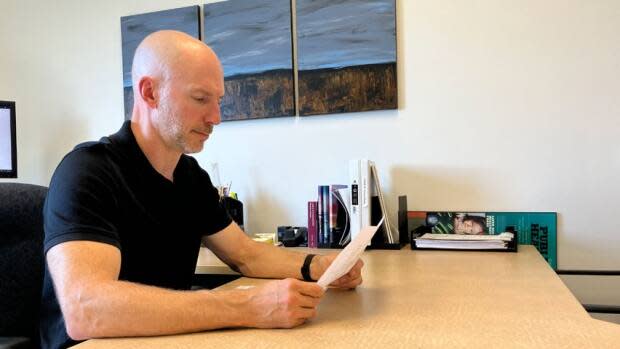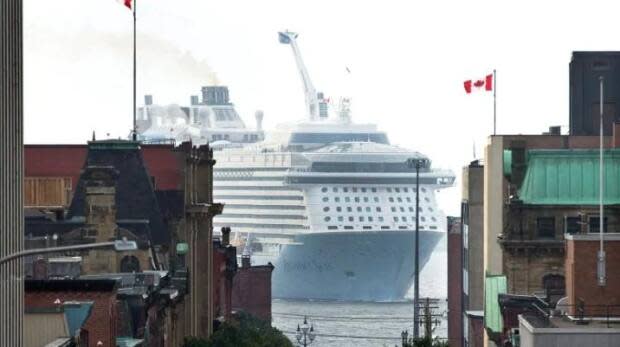Who's eligible for a fall COVID-19 booster and when? What you need to know

Has it been at least five months since your last COVID-19 vaccine or infection? Then you're eligible for a booster dose and should get it now, in anticipation of increased COVID activity this fall, says the province's acting chief medical officer of health.
Don't wait for the province to announce third or second boosters for certain age groups, or a fall vaccination campaign.
"We're trying to get away from the approach of trying to count boosters," said Dr. Yves Léger.
"We are in line with the current NACI recommendations regarding fall boosters, which is to encourage all New Brunswickers [aged five and older] to get a fall booster dose, irrespective of the number of previous doses."
The National Advisory Committee on Immunization (NACI) recommended in June that people at increased risk of severe illness from COVID-19 infection should be offered a booster shot this fall, regardless of how many boosters they've previously received. That includes people aged 65 and older.
People aged 12 to 64 "may be offered" a fall COVID-19 booster as well, the federal advisory body said.
The booster doses may be offered six months after a person's previous COVID-19 vaccine dose or COVID infection, NACI recommended.
"However, a shorter interval of at least [three] months may be warranted in the context of heightened epidemiologic risk, as well as operational considerations for the efficient deployment of the program."

It's been five months since New Brunswick began offering a second booster dose to people aged 50 and older, provided at least five months had passed since their last dose, and about two-and-a-half months since people aged 18 and older could get their second booster.
Children aged five to 11 have only been eligible for their first booster since Sept. 7, after Health Canada approved Pfizer-BioNTech's vaccine as a booster for this age group in August.
Although the province used to recommend waiting three months after a COVID-19 infection before getting a vaccine, it has increased that to five to "align" with NACI, Léger said.
"So anyone [aged five or older] who is five months or more from a previous dose or infection [is] encouraged to get a booster dose in the fall in anticipation of increased activity during the fall or winter months," he said.
2,100 opted for bivalent booster so far
People should not wait for Moderna's Omicron-specific booster to become more widely available in New Brunswick, said Léger.
"Anyone who is eligible for a booster dose should certainly consider getting the vaccine that's available to them," he said.
The Spikevax bivalent booster targets both the original coronavirus and the Omicron variant BA.1 that emerged late last year and drove the largest wave of infection and hospitalization in the pandemic.
"Bivalent vaccines certainly are a new product and they show promise of possibly having a better immune response, but we don't know yet if that necessarily translates into better protection," said Léger. "Those studies aren't available yet. Once the vaccine starts to be used, then we'll have more data that confirms whether or not it provides stronger protection or not.
"But certainly we do know that our currently available vaccines — what we call our monovalent vaccines, or the original vaccines we have — we certainly know that those are very good vaccines. They still provide very strong protection against those severe outcomes," including hospitalizations, ICU admissions and death.
The monovalent vaccines "still offer some protection against Omicron, and it's best to be up-to-date on your vaccination to prevent waning immunity." added Department of Health spokesperson Adam Bowie.
The department encourages people to book an appointment today.
Health Canada approved the bivalent on Sept. 1 for people age 18 and older.
As it stands, only New Brunswickers 50 and older, those aged 12 to 17 who are immunocompromised or have a high-risk medical condition, and those aged 18 and older who live in a First Nations community are eligible for the bivalent vaccine, as long as five months have passed since their last vaccine dose or a COVID-19 infection.
The province will look at expanding eligibility once its supply increases, said Léger. "That should be hopefully in the near future."
He could not say how soon or to how broad access could be. It will depend on how many more doses it receives from the federal government and when, he said.
Roughly 2,100 New Brunswickers have received the bivalent vaccine since it became available Sept. 14, said Léger.
People living in long-term care will be offered a bivalent booster in October, the province has said.
Vaccination rates higher than national averages
As of Tuesday, 21.6 per cent of eligible New Brunswickers have received their second booster.
That's up from 17 per cent on Sept. 11, when the national second booster average was 13 per cent, according to the most recent figures available from the Public Health Agency of Canada.
New Brunswick's first booster rate was also higher than the national average at that time, at nearly 51 per cent, compared to about 50 per cent, PHAC figures show. The province's first booster rate is now 53.7 per cent, according to the Department of Health.
Vaccination rates by age group
The percent of New Brunswickers who completed their primary two-dose series as of Sept. 11 was also higher than the country's average, at roughly 84 versus 82.
As of Tuesday, 90.5 per cent of eligible New Brunswickers have received their first dose and, 85.4 per cent have received their second dose, according to the Department of Health.
Canada drops all COVID border measures Saturday
On Saturday, the federal government will drop all COVID-19 measures at borders. Travellers will no longer need to provide proof of vaccination when entering Canada, wear masks on planes or trains, or undergo testing before boarding the massive cruise ships that frequent Saint John.
Asked for comment, Léger said travel and border restrictions are the purview of the federal government. "And they've determined that in this phase of the pandemic that border measures could be reduced."
"That being said, we still are living with COVID and we know that COVID is present here as well as elsewhere across the globe, and we need to continue to consider using those measures that we've all been using in the last 2½ years to protect us from COVID."
That includes keeping up to date on vaccinations, he said.
Federal Health Minister Jean-Yves Duclos has said Monday's decision is not a sign Canada is out of the pandemic.
"If anybody believes the pandemic is over, I invite them to visit a hospital."
But the government's data showed the importation of new variants was no longer having an effect on the evolution of the virus in country, he said.

All travellers, regardless of citizenship, will no longer have to:
Submit public health information through the ArriveCAN app or website;
Provide proof of vaccination;
Undergo pre- or on-arrival testing;
Carry out COVID-19-related quarantine or isolation;
Monitor and report if they develop signs or symptoms of COVID-19 upon arriving to Canada;
Undergo health checks for travel on air and rail;
Or wear masks on planes and trains.
The changes come after MPs and border-city mayors published an open letter to Prime Minister Justin Trudeau and U.S. President Joe Biden last week asking them to end the "unnecessary" rules at the border, a move they said would allow border communities to recover economically from the pandemic.
Léger said it's important for Canadians who are travelling to stay up to date on COVID activity in their destination and to understand that it may be higher there so they can take steps to protect themselves.
"Even though it's not, you know, a requirement now to wear masks while traveling, we certainly do continue to recommend that all travelers consider wearing a mask in public places," he said.


